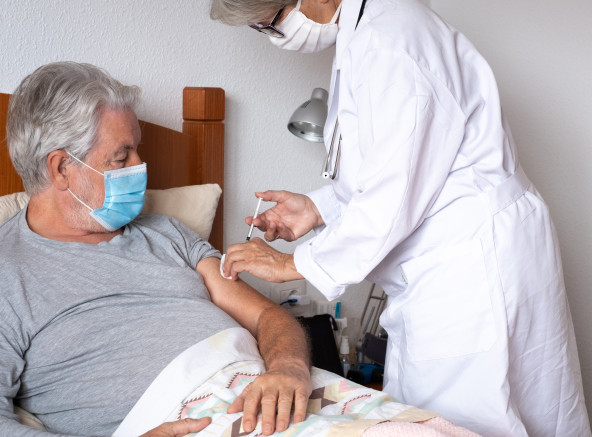Reimbursement of additional expenses and reduced income for outpatient intensive care services due to the COVID-19 Hospital Relief Act 1. do outpatient care services fall under outpatient care facilities?

Hidden in SGB XI, the COVID-19 Hospital Relief Act also includes a provision in Section 150 (4) SGB XI regarding the reimbursement of costs for additional expenses and reduced income for outpatient and inpatient care facilities, which reads as follows
"In the case of outpatient care facilities, the statutory health insurance funds and the social long-term care insurance funds shall bear the reimbursements arising under paragraph 2 in accordance with the ratio of the expenditure in the previous calendar year of the health insurance funds for home nursing care to the expenditure of the social long-term care insurance funds for long-term care benefits in kind; Section 106b paragraph 2 sentences 2 and 3 shall apply accordingly. [..]"
The question therefore arises as to whether outpatient care services are included and which reimbursements are covered under paragraph 2.
1. do outpatient care services fall under outpatient care facilities?
According to the explanatory memorandum to the law, outpatient care services are covered by the regulation in para. 4:
"Outpatient care services generally provide care services in kind in accordance with SGB XI and home nursing care services in accordance with SGB V."
Outpatient intensive care services can therefore generally assert claims.
2 Which reimbursements are therefore covered?
In accordance with Section 150 (2) SGB XI, outpatient care services are reimbursed for extraordinary expenses incurred as a result of the novel coronavirus as well as reduced income within the scope of their service provision.
Excluded are items that are financed elsewhere (e.g. via short-time working allowance or compensation under the Infection Protection Act), as double financing should be ruled out.
Reimbursable expenses/reduced income include in particular
Personnel expenses, e.g. due to overtime, new hires, job increases, use of temporary staff and freelancers either to compensate for SARS-CoV-2-related staff shortages or due to a necessary increase in staff deployment. This may relate to nursing and care staff as well as other staff and any necessary (increased) use of external services (e.g. transportation services for day care).
Increased material expenses, in particular due to infection hygiene protection measures
loss of income from outpatient nursing or care services if assignments cannot be carried out (e.g. for people in need of care who are suffering from COVID-19, due to SARS-CoV-2-related loss of staff or due to SARS-CoV-2-related non-utilization of care services). This may therefore also include the discontinuation of school escorts.
3. details of the reimbursement procedure
The details of the reimbursement procedure and the required evidence were set out by the GKV-Spitzenverband with the federal associations of the providers of outpatient and inpatient care facilities on the basis of Section 150 (3) SGB XI in cost reimbursement specifications dated 27.03.2020.
In addition to these cost reimbursement specifications, a form for claiming additional expenses/reduced income caused by SARS-CoV-2 and a list of the responsible care insurance funds for each care service can be found on the GKV-Spitzenverband website.
The claim must be made in writing. In addition to the name, registered office and institution code of the care service, the form of care, the total amount of the claimed reimbursement amount, the month for which the reimbursement amount is claimed and a reference to the underlying facts must be provided.
For the assertion of additional expenses, the amount of material expenses, additional personnel expenses for nursing and care staff and for other personnel must be itemized.
With regard to the assertion of reduced income, the income of the reimbursement month must be set in relation to the income of the reference month (this is always the month of January 2020).
In this context, the income from persons in need of care, from long-term care insurance funds and health insurance funds and from social welfare providers must be listed for both the reimbursement month and the reference month. For the reimbursement month, it must also be stated whether other income has been generated, e.g. from temporary employment.
It should also be noted that the reimbursed additional expenses/reduced income cannot be claimed again as part of the next care rate agreement or remuneration agreement.
In addition, payment is only made provisionally until a verification procedure has been completed.
4 Subsequent verification procedure
It is essential to note this: In such a downstream verification procedure, which can be initiated, for example, as part of the next remuneration negotiation, any overpayments can then be determined on the basis of requested evidence.
This evidence includes:
For personnel expenses: Proof, for example, of overtime hours ordered and worked and their remuneration, proof of new hires or job increases with corresponding salary statements, contracts with temporary companies with details of remuneration or statements and proof of personnel expenses due to employee leasing
For increased material expenses and other increased expenses: Invoices
For loss of income/reduced income: Proof of actual income including state support payments or income from temporary employment.
It is also stipulated that further evidence may be required in justified individual cases. What these are is not specified.
It is therefore important to remember once again to document and provide evidence of everything. This is because even if intensive care services are currently granted a reimbursement amount, this is always subject to the proviso that it can be reclaimed until the verification procedure has been completed.
